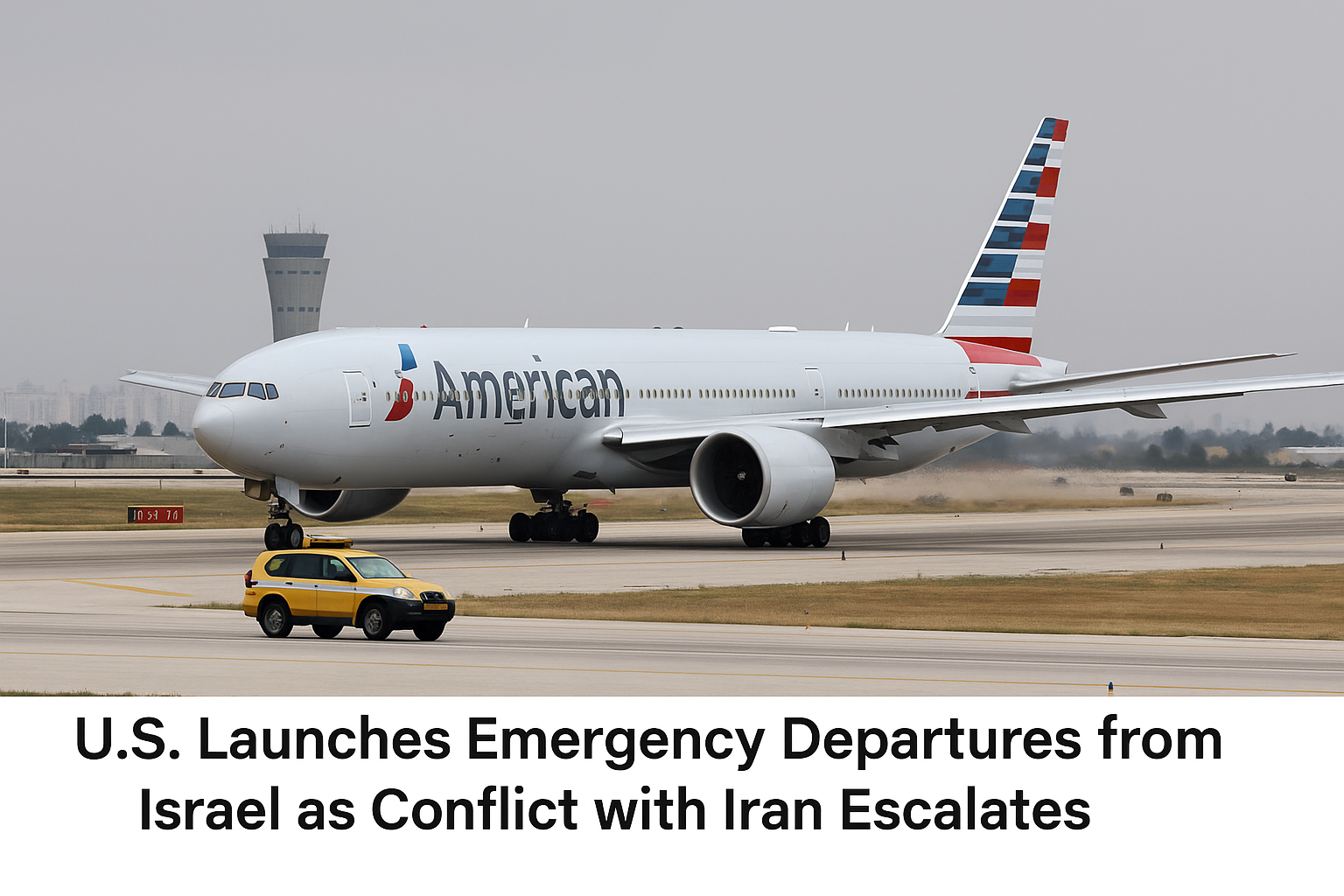In a move that marks a significant turning point in international travel security, the United States has launched emergency departure flights from Israel as tensions with Iran erupt into a full-blown military crisis. This urgent operation follows U.S. military strikes targeting key Iranian nuclear sites—Fordow, Natanz, and Isfahan—igniting fears of a broader conflict across the Middle East.
As military operations intensify, Ben Gurion International Airport in Tel Aviv has become the epicenter of global travel disruption. U.S. citizens, lawful permanent residents, and their families are being evacuated on government-coordinated flights, with the first planes departing for Athens under heightened security protocols.
Crisis Response: A New Chapter for Global Travel
The joint U.S.-Israeli airstrikes have triggered a chain reaction. Iran has vowed retaliation against U.S. military assets in the Gulf and beyond, prompting the closure or restriction of airspace across Israel, Iran, Iraq, and Syria. Airlines, cruise companies, and shipping firms are now scrambling to adapt to a rapidly shifting travel environment.
Airlines including Lufthansa, Emirates, Delta, and British Airways have rerouted or canceled flights over the region. The FAA and EASA have issued heightened risk notices, advising all carriers to avoid the Gulf and Israel’s surrounding airspace. Flights bound for Asia from Europe are now detouring through safer corridors over Turkey and Egypt, extending journey times and stretching operational capacity.
Stranded Tourists and Scrambling Embassies
As of June 22, over 1,200 American citizens remain in Israel seeking evacuation or alternate exit strategies. The U.S. State Department has prioritized departure assistance for those most at risk, with limited seats available through emergency charter operations.
These departure flights, operated by civilian aircraft under government charter, are scheduled to depart daily as long as airport conditions remain stable. Nearby nations such as Cyprus, Jordan, and Greece are assisting in transit and accommodation support for evacuees, creating temporary shelters and coordinating visa clearances.
Embassies across the region are operating 24/7 crisis centers. The Smart Traveler Enrollment Program (STEP) is the primary platform through which the U.S. is coordinating communication with Americans abroad. Officials urge immediate enrollment for those in or near conflict zones.
Impact on Air Travel, Cruise Lines, and Logistics
Beyond passenger flights, global trade is also in flux. The Strait of Hormuz, responsible for one-fifth of global oil transit, is under watch as Iran threatens to block or disrupt maritime traffic. Tanker companies and shipping insurers have raised alert levels, and cruise lines that once operated itineraries through the Arabian Gulf are canceling routes or diverting to safer waters.
Royal Caribbean, MSC Cruises, and Norwegian Cruise Line have suspended sailings that previously touched Middle Eastern ports. Maritime security firms warn that if the conflict spreads, even eastern Mediterranean ports like Cyprus and Crete could be at risk of temporary shutdown.
Oil Prices Surge, Travel Costs Follow
Crude oil prices surged past $100 per barrel following confirmation of the U.S. airstrikes, with immediate implications for global travel. Fuel surcharges are expected to rise, affecting both commercial airline fares and logistics rates for cargo and supply chains.
For passengers, the impact is clear: longer flights, fewer route options, increased fares, and greater uncertainty. Travel insurance providers are also tightening coverage clauses, particularly those relating to acts of war, terrorism, and forced cancellations.
Ben Gurion Airport: Open, But Under Strain
While Ben Gurion Airport remains operational under military guidance, most international carriers have halted operations through June 30. Only government-chartered, humanitarian, or military aircraft are currently permitted for outbound service.
Terminal traffic has dwindled, with security forces overseeing tightly regulated boarding procedures. U.S. embassy teams are on-site coordinating documentation, screening, and transportation for departing citizens. Still, many travelers have been left stranded due to capacity limitations and rapidly changing logistics.
Tourism Industry in Crisis Mode
Tourism operators across Jordan, Cyprus, Turkey, and even Southern Europe are preparing for an influx of redirected travelers and displaced tourists. Greek authorities have reinforced customs and immigration staff in Athens to handle the incoming wave of evacuees. Meanwhile, Turkish hoteliers report a spike in emergency bookings from U.S., Canadian, and EU travelers fleeing the region.
Travel agencies are reporting mass cancellations of summer itineraries throughout the Middle East. Popular pilgrimage routes, leisure packages to the Red Sea, and business travel to Tel Aviv and Dubai are among the hardest hit.
U.S. State Department Issues Level 4 Travel Warning
The U.S. State Department has elevated travel warnings for Israel, the West Bank, Iran, and neighboring countries to Level 4—Do Not Travel. Officials emphasize that remaining in the region places travelers at risk of being caught in airstrikes, missile retaliation, or civil unrest.
Those unable to evacuate are urged to shelter in place, maintain situational awareness, and prepare emergency provisions. Military bases in Bahrain, Qatar, and the UAE have entered high alert, and NATO partners are reassessing regional defense deployments.
Tourism Outlook: Summer Under Siege
As the global tourism economy recovers from post-pandemic volatility, the Middle East conflict now represents a new and profound challenge. Airlines and travel providers must recalibrate operations, and travelers are left weighing whether planned holidays remain viable or safe.
Tourism-dependent economies across the Eastern Mediterranean are racing to offer secure alternatives and maintain confidence among international visitors. However, experts warn that prolonged conflict or retaliatory escalation could depress global travel through the remainder of 2025.
What Travelers Should Do Now:
- Avoid all non-essential travel to Israel, Iran, Iraq, Syria, and surrounding territories.
- Enroll in STEP to receive alerts and coordinate with the U.S. State Department if abroad.
- Check airline updates daily for rerouted or canceled flights.
- Secure travel insurance with emergency evacuation and war-risk coverage.
- Stay informed through embassy websites and official government advisories.
The launch of U.S.-assisted departure flights from Israel underscores the fragile state of global mobility in times of conflict. As borders tighten and skies close, travelers and the tourism industry face their most uncertain test in years.
For more travel news like this, keep reading Global Travel Wire
















